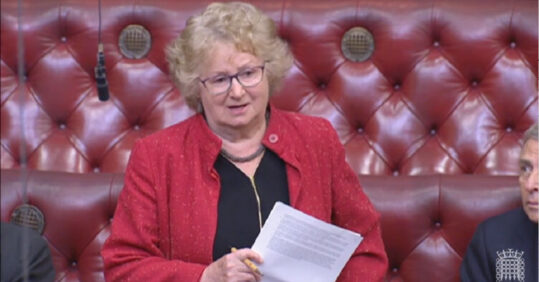House of Lords debate calls for clarity and action over adult social care

A debate in the House of Lords on the future of social care called for clarity and action from the Government over the worsening state of adult social care services in the UK.
The debate, held on 30 March, was planned to coincide with the publication of the Government’s white paper on adult social care, People at the Heart of Care.
However, members of the House of Lords were informed that the paper’s publication would be delayed until a date during Parliamentary recess, between 30 March and 17 April.
In the absence of the Government’s white paper, Lords from all parties echoed concerns that social care is facing issues of staffing, funding, and, organisation.
Social care is too complicated
A common theme expressed by a number of speakers in the debate is that social care has become too complicated, both in terms of the way the sector has managed and in terms of experience for the service user.
Baroness Shephard of Northwold said that in the last 25 years there have been ‘no fewer than eight Green Papers, four White Papers, three cross-parliamentary committees and two full government inquiries’ on the subject of social care reform.
Related Article: BREAKING: Nurses to staff neighbourhood health centres under 10-year plan
Baroness Shephard told the House of Lords that: ‘We should ask ourselves why it is that a sector so vital to one in five of our population at any one time… has been so over-studied and, as we found, so under-resolved.
‘It is mostly, I suggest, because it has “just grown”, and is now highly and almost unmanageably complex.’
Currently, social care funding receives £11bn, from private expenditure, £22bn from central government grants and council tax, and a further £1321bn of services is believed to be contributed by unpaid careers and family, according to Baroness Shephard.
Commissioning in England is then split between 152 local authorities and the NHS, where residential services are 95% independently operated. National accountability at the level of Government is then divided between the Treasury, NHS, and levelling-up department.
Lord Polak, a member of the adult social care committee, described, from his own experience, how these complications can make accessing services difficult and frustrating for services users.
He described how, while trying to apply for social care his mother was assessed by a nurse remotely.
He said: ‘The nurse was in Kent and my mother was over 200 miles away, unable to communicate, in her bed in Liverpool.
‘The report, compiled by a nurse who has never met my mother, was then to be sent to an unknown panel of people who also have never met her to decide the best course of treatment and care. This absurd assessment was executed over a three-hour Zoom call seven weeks ago, and as I stand here today, we have heard nothing.
‘The system is sadly broken. As we speak, we should consider that people up and down the country are battling to understand an incomprehensible system at the same time as trying to care for their loved ones as best they can.’
Related Article: NHS Unite members in Wales reject pay award and signal appetite for strikes
Social care needs to be better staffed
Workforce was another issue of concern for those debating the issue, with comments particularly focused on media reports that the Government had plans to cut the £500m workforce budget by half.
Lord Bradley, a member of the adult social care committee, said that ‘the current situation of low pay, limited career opportunity and thousands of vacancies in the sector is an utter disgrace.
He added that: ‘The committee’s recommendation that the Government must produce, with people who work in and draw on adult social care, a comprehensive, long-term, national workforce and skills plan, is an absolute priority.’
Members of the adult social care committee, led by Baroness Andrews, also called on the Government to create a commissioner for care and support, saying that this would ‘hold minster’s feet to the fire, to do some shaming if necessary, but also to celebrate and mobilise the best’.
Baroness Andrews said that this would ensure that ‘Government cannot get away with any more delay and procrastination’ on social care.
Parliamentary under secretary of state at the Department of Health and Social Care, Lord Markham, speaking in response on behalf of the Government, said that he felt his ‘hands are slightly tied behind my back, having to make this speech prior to the publication of our report.’
Lord Markham said that he could not comment on the reported cuts to workforce funding, however he told the House of Lords that: ‘We all know that the social care workforce is one of our biggest assets, but we recognise the challenge we have right now to recruit a workforce of the right size, with the right skills, that feels appropriately motivated and rewarded.’
Related Article: New ‘first-of-its-kind’ adult social care nursing faculty
He also announced that the upcoming plan for the adult social care workforce would ‘ include proposals for a new adult social care workforce pathway.

See how our symptom tool can help you make better sense of patient presentations
Click here to search a symptom




